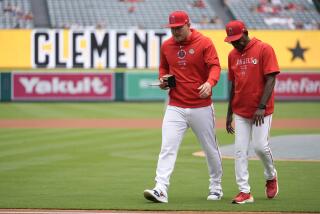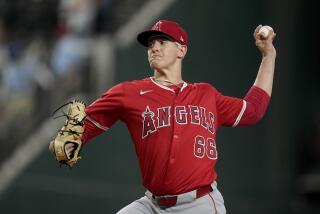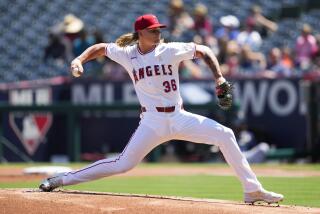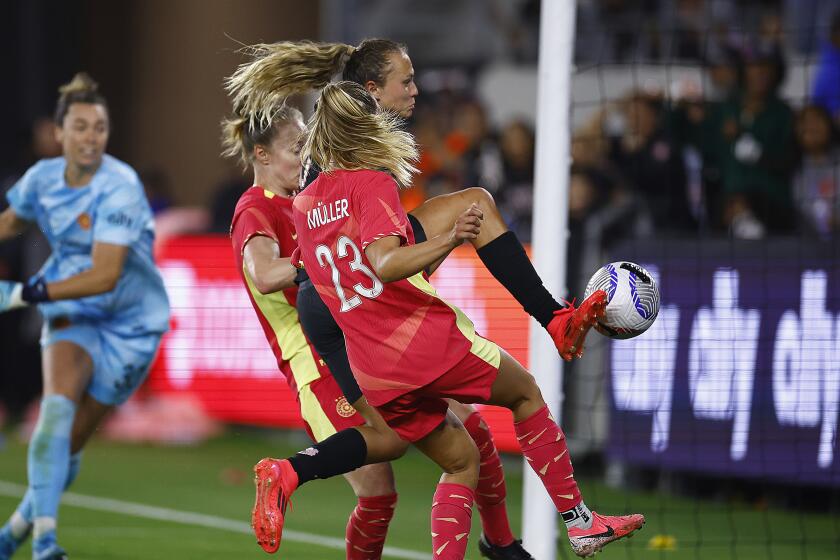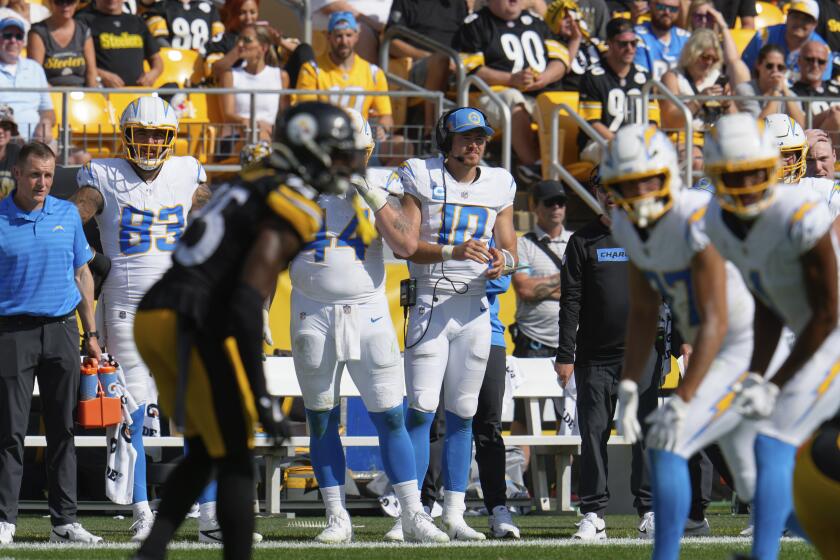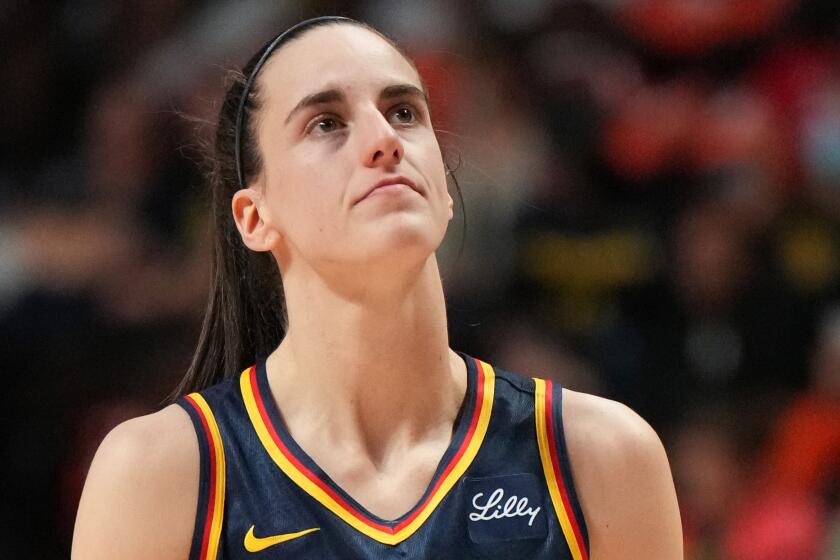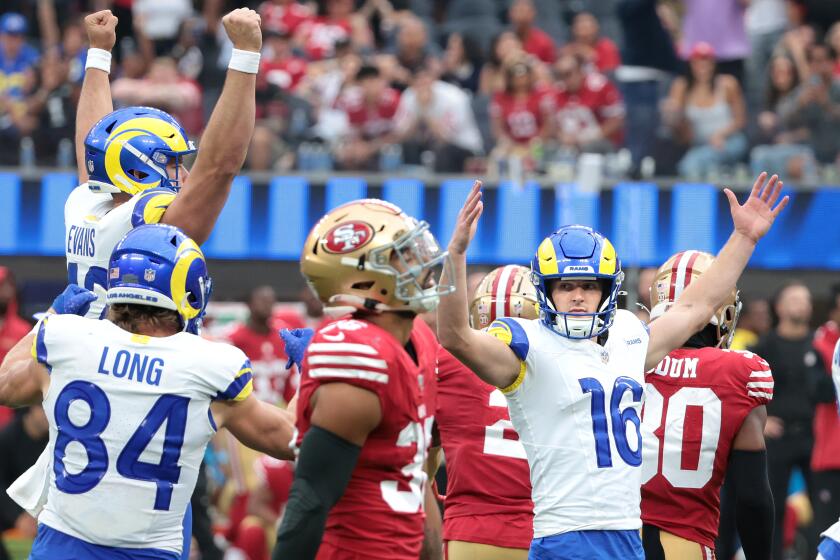Giving award to Angels’ Mike Trout is no rookie mistake
It was not news that Mike Trout was selected American League rookie of the year Monday. It was a given.
If you are a baseball fan and don’t know about Trout, then you aren’t a baseball fan. He arrived on the scene to stay on April 28. The Angels had started as if they had sludge in their engine. They had a 6-14 record and, as it turned out, never recovered enough from that April agony to be a playoff team.
When they called up Trout from triple-A Salt Lake, they needed a spark plug and got a turbo-charger. After spending much of spring training nursing a virus and a sore shoulder, Trout had dismantled triple-A pitching at a .403 clip. The Angels would have been happy for 70% of that.
Instead, they got Superboy. Trout wouldn’t turn 21 until Aug. 7, and by then he had taken all of major league baseball by the lapels and shaken it.
“There was no eureka moment with him,” Manager Mike Scioscia says. “We just started noticing, early on, that he was hitting some nasty shots to right field. And that was against some really good pitchers.
“Pretty soon, when it kept happening night after night, we knew we were onto something pretty special.”
Pretty soon, Scioscia says, no less than Albert Pujols was stopping by his office to chat about how much fun it was to watch Trout getting so good so fast. And Torii Hunter was gesturing writers over to his locker to make sure they weren’t missing the obvious, that something huge was happening right in front of their eyes.
Trout is the youngest winner of the AL rookie-of-the-year award, and he was a unanimous choice, far ahead of Oakland outfielder Yoenis Cespedes and Texas pitcher Yu Darvish.
Monday’s honor, as meaningful as it must be to anyone who receives it, is merely a nod to the obvious. Trout’s numbers, in a sport that lives and dies with them, are overwhelming. He hit .326, second in the AL behind Miguel Cabrera of Detroit, and fourth in the majors. He scored 129 runs and had 182 hits, 30 home runs, 83 runs batted in and 49 stolen bases.
All that and he also made highlight-film catches — a bunch of them — in center field.
They will announce another award Thursday, and that one will not be a nod to the obvious. The AL most valuable player is a race between Trout and Cabrera. It is also a Rubik’s Cube challenge to the voting national baseball writers. (Times writers are not allowed to vote.) Cabrera hit more home runs and drove in more runs; Trout stole more bases and scored more runs. Cabrera’s team made the postseason; Trout’s did not.
Scioscia has an expectation and an opinion.
“Some voters put a lot of weight on how the team did, and we missed the playoffs,” he says. “But I’ll say one thing: Nobody made a bigger impact on their team this season than Mike did on ours.”
A dash from high school baseball in Millville, N.J., to triple A in Salt Lake, to the MVP in the big leagues in about four years may be too big a fairy tale for even Trout to comprehend.
And, perhaps, handle.
Scioscia says he has never seen any player “hit the ground running” the way Trout did. He also says Trout has unusual maturity for his age.
“He gets it,” Scioscia says. “He comes to the ballpark every day knowing what comes first, and that is his team and his performance.”
Scioscia credits the Angels’ public relations staff, headed by team Vice President Tim Mead, for helping keep Trout grounded and well-publicized as his amazing year developed.
MVP or not, 2013 will bring the big spotlights from the first moment Trout steps onto the field at spring training in Arizona. The first dozen interviews will include questions using the phrase “the sophomore jinx.” By March 15, he will be allergic to microphones and notepads. He may need a time-management guru more than a hitting coach.
Scioscia says Trout can handle it, and says he sent him back home to New Jersey with orders “to decompress for a while,” and to get to Arizona earlier so his throwing arm doesn’t stiffen up from underuse in the snow piles.
“I’m from back there in the East,” Scioscia says. “I know how that goes, because it was the same for me.”
It is likely, too, that Trout will shift from center field to left, with the projected reinsertion of Peter Bourjos in center. With them patrolling two-thirds of the outfield, the Angels might ponder changing the surface from grass to cinders. They might also consider roping off two sections of the stadium — one for baseball scouts and another for Olympic sprint coaches.
“I like center field a lot better,” Trout says, “but if it will help the team win, I’ll go wherever they put me.”
MVP or not, Trout will walk into 2013 with horns blaring and confetti flying. In the eyes of the media, he has gone from superboy to superstar.
Scioscia says he’s not worried. If you can handle Justin Verlander’s 94-mph fastball, down and away, you can handle anything.
Trout is a great story and great talent. And it’s only three months until pitchers and catchers report.
More to Read
Go beyond the scoreboard
Get the latest on L.A.'s teams in the daily Sports Report newsletter.
You may occasionally receive promotional content from the Los Angeles Times.
